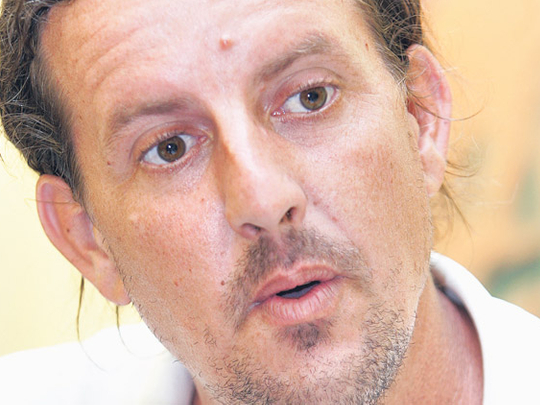
Dubai: Not far from the Nad Al Sheba Avian Reproduction Research Centre lies the Dh16 million National Falcon Centre, constructed in 2004 by the Dubai government to serve as a hub for the growing falconry industry in the emirate.
Inside, 20 shops tout everything from falcon hoods fashioned by ateliers to striking falconry artwork by local artisans.
After a short walk past grand wall murals recounting the centuries-old Arab fascination with the bird, visitors happen upon the cozy offices of Al Hurr Falconry Services, a long-standing Dubai business that offers pigeon control to large buildings in the emirate.
During the heat of Dubai's midday, Dave Stead, Managing Director of Al Hurr Falconry Services, is catching up on paperwork while his family of mostly Peregrine falcons rests on screen perches in the back room after a morning filled with flights above some of Dubai's most iconic structures.
Business is growing, Stead said.
As the Dubai skyline grows taller and more crowded with world-famous architectural structures, falconry services are pivotal in some areas to remain free of pigeons.
Al Hurr Falconry Services sweeps up to 15 building areas per day.
He's quick to point out the effectiveness of the birds against large pigeon flocks which have a "genetic memory" of the Peregrine falcon as a deadly predator because it can fly faster and often strike with deadly accuracy.
"The Peregrine falcon is the fastest animal on the planet at about 200 kilometres per hour," said Stead.
In what's referred to as the falcon swoop, falcons "gain altitude up to 1,500 feet, fold their wings back and fall from the sky".
A dive-bombing falcon screeching across the great blue yonder instils terror in pigeons and when the falcon is released for daily flights over the same area time and time again, pigeons quickly move to another area after falsely believing that the falcon lives in the direct vicinity.
"When a pigeon sees a silhouette of a falcon, they go ballistic," Stead said.
"My job is to make them leave the area. Falcons are trained for negative enforcement. We fly four or five days a week depending on the facility. The pigeons just believe the falcons live there."
Stead said each bird flies its regular route each day and after effectively putting in its shift, has finished work.
Mack the Knife, a young Peregrine falcon, has been flying a wide section of Dubai's coastline near Madinat almost every day for five years. But Mack is like most falcons and would rather be left alone on his perch in peace and quiet than keeping his flying log up to date, Stead said.
"Falcons are incredibly lethargic, like snakes with feathers," he said. "Flying is not their favourite activity. It's not like taking a dog to the park. The birds aren't getting a lot of amusement from flying. It's about energy conservation."
Similar to conditions in the wild, falcons only fly to hunt for food to retain their body reserves to stay in peak condition.
Stead's falcons, however, never attack birds in the air and are trained to return to their owners for food when they're hungry.












